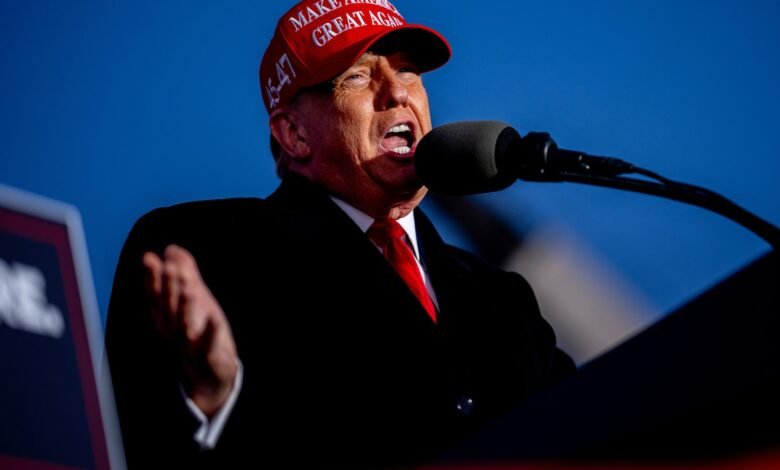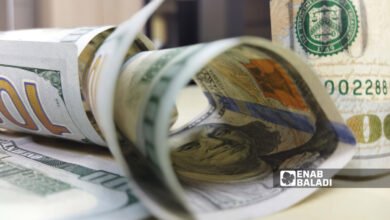Opinion | Devaluing the dollar, one of Trump’s worst ideas yet

Trump’s objective, Politico reports, is to boost U.S. exports and reduce imports. Basically, if a dollar buys, say, fewer euros or Japanese yen than it currently does, that makes U.S.-made products look a little cheaper and potentially more attractive to European and Japanese customers (among others). So, hey, maybe this could help some U.S. companies trying to sell products abroad.
That is, until you consider everything else that might happen if we deliberately tried to weaken our currency, which would open up a Pandora’s shipping container of disastrous consequences.
It’s true the dollar is unusually strong right now, although probably not for reasons Trump is happy about. Exchange rates typically reflect a country’s macroeconomic conditions (among other factors, such as interest rates). Thanks to a variety of factors — including our relatively limited exposure to the war in Ukraine — we’re doing better than most of our peer countries. In the words of Kenneth Rogoff, a Harvard professor and former International Monetary Fund chief economist, “The U.S. economy has been on a tear.”
The relative strength of the dollar does make U.S.-made goods less attractive, though with so many other countries in or edging toward recession, our potential global customers might not be feeling terribly flush anyway. I suppose if Trump tanked the U.S. economy, whether on purpose or otherwise, that might achieve his objective of swiftly weakening the dollar and shrinking trade deficits.
If not via recession, how would Team Trump weaken our currency? That’s not totally clear. He might try to force the Federal Reserve to cut interest rates. This is something Trump already wants to do for other reasons. (For instance, he owes a lot of debt, so lower rates would help his own finances.) Or maybe he would bully lots of other countries into raising their interest rates, which seems unlikely to happen. But if it did, it might result in a global recession.
Or perhaps he would tax foreign financial flows into the United States, as some senators have proposed. This, too, would likely tank the economy, according to Peterson Institute for International Economics fellow Maurice Obstfeld.
(Noticing any themes here?)
Whatever the mechanism, a weaker dollar would likely lead to higher prices for American consumers, and not just during their summer vacations to Italy. Americans buy a lot of imported goods, from fruit to toys to cars to home furnishings. Those would all get more expensive as the purchasing power of the dollar fell.
So much for Trump’s pledge to vanquish inflation. And that’s not the only problem with his plan.
Perhaps some U.S. exports would get more competitive, as Trump hopes. Ironically, though, some U.S. industries that stand to benefit most from a weaker dollar are not exactly Republican darlings. They include Big Tech, Hollywood and higher education, sectors that enjoy some combination of being quite competitive at exporting things and/or having large offshore profits, which would become more valuable.
There’s also a risk that other countries won’t want to go along with Trump’s scheme. Our trading partners might engage in a series of countermeasures to keep their currencies from appreciating against the dollar, which we might meet with counter-countermeasures, and so on. In other words, we might see a sequel to the trade wars Trump initiated before.
Global trade or currency wars would, again, likely be bad for pretty much everyone, including U.S. businesses and consumers.
Deliberately weakening the dollar, or even attempting to, also threatens its role as the world’s “reserve currency.” We have a stable government that has reliably paid its bills and doesn’t do dodgy things to deliberately manipulate the value of its fiat currency. As a result, the dollar is widely used in international trade and dollar-denominated U.S. government debt is in high demand.
The fact that U.S. dollars are considered a virtually risk-free store of value gives the United States some huge privileges. It enables us to keep spending more than we collect in taxes, since it’s cheap and easy for our government to borrow to finance ever-growing deficits. Eroding the dollar’s global use might make it more expensive for the U.S. government to keep borrowing so much (which means taxes might need to rise, or spending decline, to cover budget shortfalls).
We might also weaken our ability to impose sanctions upon countries, businesses or individuals whose actions we disapprove of, since dollars are used so often in international transactions and we have some ability to restrict those transactions.
Then again, maybe we should give Trump some credit. Reducing our global influence, and specifically our ability to punish certain global villains, might be exactly what we he wants.
Source link





